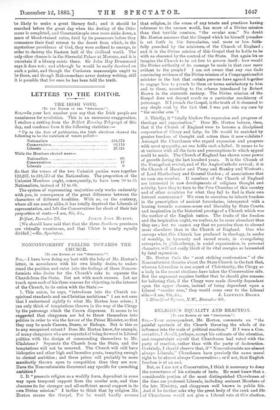NONCONFORMIST FEELING TOWARDS THE CHURCH.
[To THE EDITOR OF THE " SPECTATOR.”1
have been doing my best with the help of Mr. Horton's letter, in accordance with his own kindly desire, to under- stand the position and enter into the-feelings of those Noncon- formists who desire for the Church's sake to separate the Church from the State. But not with much success. Let me touch upon each of his three reasons for objecting, in the interest of the Church, to its union with the State :- 1. This union, he says, "introduces into the Church un- spiritual standards and un-Christian ambitions." I am not sure that I understand rightly to what Mr. Horton here refers ; I can only think of temptations thrown in the way of the Clergy by the patronage which the Crown dispenses. It seems to be suggested that clergymen are led to throw themselves into politics in order to win the favour of the Prime Minister, so that they may be made Canons, Deans, or Bishops. But is this so to any recognised extent P Does Mr. Horton know, for example, of many clergymen who are suspected of being forward in Liberal politics with the- design of commending themselves to Mr. Gladstone ? Separate the Church from the State, and the temptations will not be removed. The Church will still have bishoprics and other high and lucrative posts, tempting enough to. clerical ambition ; and these prizes will probably be more manifestly thrown open to competition than they are now Have the Nonconformists discovered any specific for quenching ambition ?
2. It " presents religion as a worldly force, dependent in some way upon temporal support front the- secular arm, and thus obscures its far stronger and all-sufficient moral support in its owls Divine mission." I incline to think that by religion Mr. Horton means the Gospel. For he would hardly assume
that religion, in the sense of any. tenets and practices having reference to the unseen world, has more of a Divine mission than that terrible creature, "the secular. arm." No doubt Mr. Horton assumes that the Gospel which ha himself preaches is set forth. in the formularies, and more or less., faith, fully preached by the ministers, of the Church of England ; and it is the Divine mission of this Gospel that he holds to,be with us obscured by the control of the State. Bat agaialet us imagine the Church to be set free to govern itself: how.would the Divine authority of its measage be made in that case more evident to the people ? I ant. not aware- that any one finds convincing evidence of the Divine mission of a Congregationalist minister in the feet that certain persons have agreed together to engage him to preach to them on terms satisfactory to him and to them, according. to the. scheme introduced by. Robert Brown in the sixteenth century. The Divine mission of the Gospel does not depend much- on a particular machinery of patronage. If I preach the Gospel, is the truth of it obscured to any single soul by the fact that .I was put into my cure by "the secular arm''?
3. Thirdly, it "fatally hinders the expansion and progress-of theology and organisation." Does Mr. Horton believe, then, that if the Church of England were to become a disciplined corporation of Clergy and laity, its life would be enriched by greater freedom of thought and action than- it now-exhibits-? Amongst the Churchmen who regard expansion and progress --
with most sympathy, no one holds such a belief. It seems to be at variance with all the facts and presumptions to which appeal could be made. The Church of England has shown some power of growth during the last hundred years. It is the Church of the Evangelical revival, and of the Anglo-Catholic revival; it is the Church of Maurice and Pusey and Stanley and Westcott ; of Lord Shaftesbury and General Gordon ; of associations that no man can number. If members of the Church of England are interested in new developments of religious thought and .
activity, have they to turn to the Free Churches of this country and of other countries for what they fail to find in their own fettered communion ? We seem to ourselves to inherit freedom in the prescription of ancient formularies, interpreted with a leaning towards common-sense and liberality by State Courts, and inspiration in the historical prestige of a Church which was the mother of the English nation. The fruits of the freedom and the inspiration ought, we confess, to be more abundant than they are ; but we cannot say that we perceive them to abound more elsewhere than in the Church of England. One who surveys what this Church has produced in theology, in modes of worship, in hymnody and sacred music, in evangelising enterprise, in philanthropy, in social organisation, in personal character, will not easily think of its vital energies as benumbed by fatal repression..
Mr. Horton finds the " most striking confirmation." of. the Nonconformist theories about the State Church in the fact that,
whereas Liberalism is one aspect of Christianity, the Clergy as a body in the recent elections have taken the Conservative side. But the argument requires further that he should give reasons.
for believing that, if the Clergy were made directly dependent upon the upper classes, instead of being dependent upon .a Liberal "secular arm," they would come over to the -Liberal


















































 Previous page
Previous page